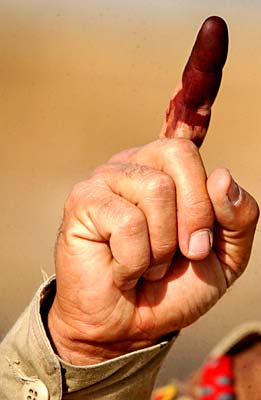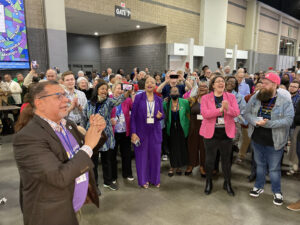
BAGHDAD, Iraq (BP)–Iraqis will go the polls Dec. 15 for a landmark election, voting on a new parliament that will represent the citizens for the next four years.
It will be the third election the country has held within the past year. Last January, Iraqis elected a temporary parliament and in October adopted a draft constitution. The new parliament will replace the temporary one.
The Bush administration hopes the election will lead to more stability and less violence, and it has reason to be cautiously optimistic. On Dec. 13 more than 1,000 Sunni clerics urged their followers to participate in the election, the Associated Press reported. Many Sunnis boycotted the January election. The terrorist insurgency in Iraq has been driven in large measure by Sunni Muslims, who are in the minority. Iraq is comprised mostly of Shiite Muslims.
Al Qaida in Iraq and five other insurgent groups said they will not attack polling places, AP reported, although the groups said they would continue to attack U.S.-led forces.
Daniel Heimbach, an ethics professor at Southeastern Baptist Theological Seminary in Wake Forest, N.C., called Sunni participation “a very hopeful sign indeed.” Heimbach served in the first Bush administration and has been credited with composing the moral framework adopted by President George H.W. Bush for the 1991 Persian Gulf War.
“It means the Sunnis are accepting the process,” Heimbach told Baptist Press in an e-mail. “It means they are starting to believe the process will work in a trustworthy way. And that means civil war is no longer very likely.”
Iraq is made up of three factions: Shiites in the south, Sunnis in the center and Kurds in the north. The Sunni boycott of the January election allowed Shiite and Kurds to win most of the seats in the temporary governments. A Shiite coalition known as the United Iraqi Alliance won 48 percent, while a coalition of Kurdish parties won 26 percent. The Iraqi List, a secularly minded slate of candidates led by former Prime Minister Ayad Allawi, finished third with 14 percent. The new government, though, likely will have significant Sunni representation.
Heimbach believes Sunni participation could assist the advancement of religious liberty in the country.
“As [the election] affects religious liberty, I think it is most important that two things come together in this election — popular Iraqi support for recognizing the legitimacy of this election combined with moving ahead with the provisional constitution that treats religious liberty as essential to democratic government. Sunni participation in this election will soften opposition to democratic government in Iraq. And softening of Sunni opposition to democratic government will mean greater support for religious liberty among Iraqi factions.”
The Iraqi constitution, Heimbach, said, contains two “diametrically opposing views” on religious liberty that will have to be worked out in the future. One part of the constitution, he said, supports rule by Islamic law, while another part guarantees religious freedom.
“This has to be a matter of grave concern to Christians,” he said. “But we should also be grateful that religious liberty is being debated so seriously. For all its faults, the draft Iraqi constitution makes religious liberty a very real possibility in the midst of the Islamic world.”
Popular support for democracy, Heimbach said, “has spread across Iraq and is visible in many practical ways.”
“There is stability and growing prosperity in the Kurdish north. The economy in the Shiite south is now better than it ever was under Saddam. And even though tensions still exist in the Sunni triangle, those tensions have been growing less while the common people in those areas have been getting back to work and thriving more than ever before,” Heimbach said. “Iraq is making steady progress toward ever greater stability and the December elections will help speed that progress even more.”
Craig Mitchell, assistant professor of Christian ethics at Southwestern Baptist Theological Seminary in Fort Worth, Texas, and an inactive reserve Air Force officer, said he has concerns about the future of religious liberty in Iraq.
“I believe that these elections can result with a stable Iraq, but I do not know if religious freedom is a serious possibility,” Mitchell said in an e-mail. “The situation regarding religious freedom is reminiscent of the saying that we have both kinds of music: country and western. Since one of the major divisions in Iraq concerns the Shiite majority and a Sunni minority, I fear that the closest they might get to religious freedom is a freedom to be Muslim.”
But a democratic, stable Iraq could have a dramatic impact on the Middle East, Mitchell said.
“There is a growing movement for democratic reform throughout the Middle East that will result in a more pacific and economically productive group of nations,” he noted. “As these reforms happen, there will be a tendency for more religious freedom. It is for these reasons that the terrorists attempt to disrupt our rebuilding efforts in Iraq. They would like to see a civil war even if it means that the Sunnis are wiped out. As long as there is turmoil in Iraq, the rest of the Middle East will continue in its instability.”
Mitchell said Christians worldwide must pray for the election.
“We need to pray that these elections will result in a stable Iraq,” he said, “because this will result in the greatest opportunity for religious freedom and in the greatest possibility for people coming to a saving knowledge of Jesus Christ.”
–30–
















